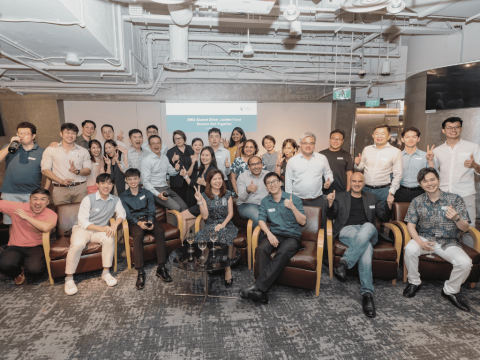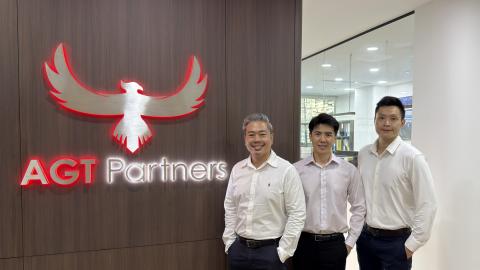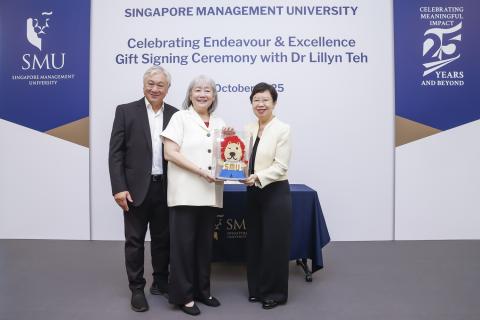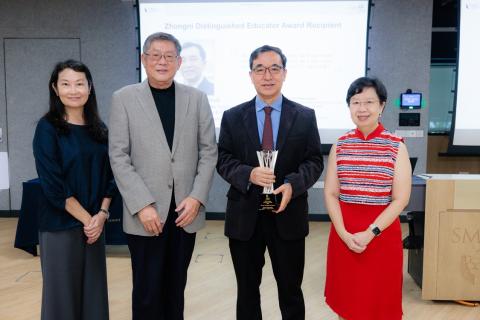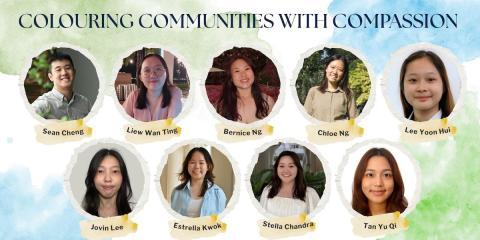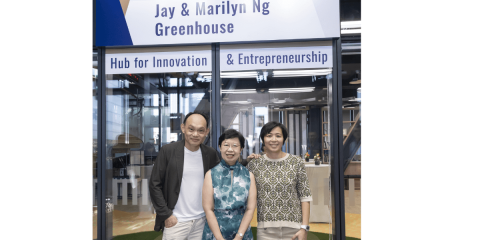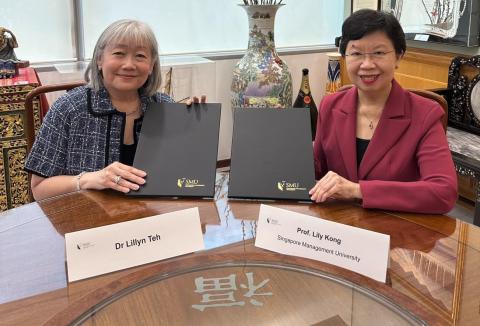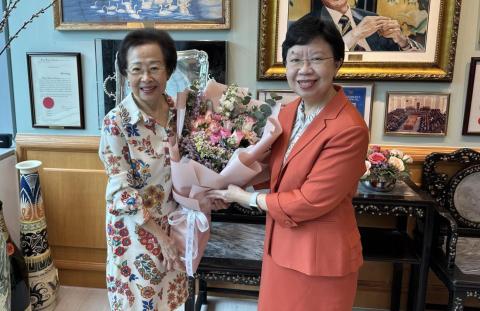The Ngee Ann Kongsi and Singapore Management University partner to promote research on elderly well-being
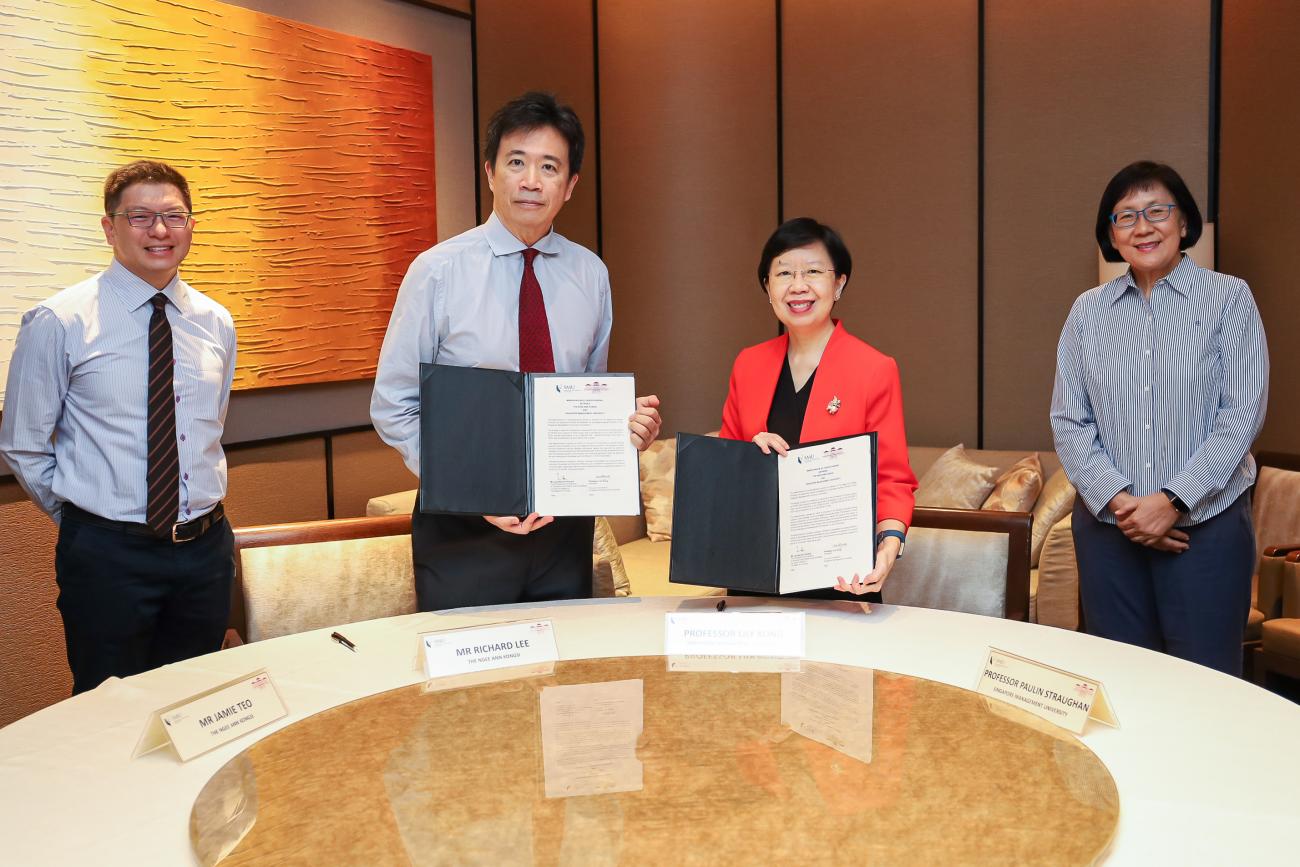
The Ngee Ann Kongsi intends to support SMU with $15 million over seven years, which will be SMU’s largest non-government research funding to date
The Ngee Ann Kongsi and Singapore Management University (SMU) announced today at a virtual media briefing that The Ngee Ann Kongsi has formalised its intention to contribute $15 million over seven years to SMU, in support of research on elderly wellbeing and successful ageing in Singapore. The event was graced by Guest-of-Honour, Mr Tan Chuan-Jin, Speaker of Parliament and Chairperson of the People's Action Party (PAP) Seniors Group.
The intended $15 million funding support will go towards the growth and expansion of SMU’s Centre for Research on Successful Ageing (ROSA). This amount will be the largest research funding that SMU is receiving from a non-government organisation. It is also a significant milestone for The Ngee Ann Kongsi as it will be its largest donation towards research to date. Since the 1930s, The Ngee Ann Kongsi has been making significant contributions to the education scene in Singapore, supporting schools and tertiary institutions through donations and scholarships to benefit not only the Teochew community, but all Singaporeans.
As part of the intended funding support, $1.5 million will go towards ROSA to help scale the centre’s translational initiatives this year. The Ngee Ann Kongsi has also formalised the intention to provide financial support towards ROSA for the next six years.
The partnership will enable ROSA to increase its outreach efforts to share the Centre’s findings with targeted groups, including policy makers, academia, non-profit organisations, and non-government organisations. It will also further strengthen the translation of research insights into policy innovations that advance the holistic well-being[1] of older adults in Singapore. This comes on the back of a $9.95 million Tier 3 grant from the Ministry of Education, one of the highest given to a social sciences research project in Singapore.
In commending this initiative, Guest-of-Honour, Mr Tan Chuan-Jin, Speaker of the Parliament of Singapore, and Chairperson of the People's Action Party (PAP) Seniors Group, said, “Getting Singapore prepared for successful ageing requires long-term planning and constant feedback from the community. The partnership between SMU and The Ngee Ann Kongsi sets a strong example of how tertiary institutions and non-government organisations can work together to achieve the goal. This is a timely partnership to improve elderly outreach and welfare initiatives, as Singapore gears up for the post Covid-19 future. I hope to see more of such collaborations that bring together the resources, knowledge, experts and experiences across different fields. Together, we can help our seniors lead meaningful and fulfilling lives".
Mr Jamie Teo, President of The Ngee Ann Kongsi, said, “We are always exploring opportunities to strengthen our philanthropic support for the education scene in Singapore, to benefit not only the Teochew community, but all Singaporeans. SMU was the first university in Singapore that The Ngee Ann Kongsi donated to, back in 2007. We have since enjoyed a strong, long-standing relationship, and have supported the university’s growth in various areas. We hope that our intended funding support of $15 million will help to support the continued growth and expansion of ROSA, and in turn, build a more inclusive society that advances elderly wellbeing and successful ageing.”
Professor Lily Kong, President of SMU, said, “I would like to convey our sincere appreciation to The Ngee Ann Kongsi for this significant gift. It affirms the quality and rigour of SMU’s research, and the impact that our research creates. Ageing is a pressing and complex issue for Singapore, impacting individuals and the country. Many factors come into play in ageing successfully, such as economic and social engagement, and physical and mental health. This generous gift by The Kongsi will strengthen ROSA’s capabilities to create new knowledge and offer multidisciplinary insights into Singapore’s ageing situation. It will provide a more holistic understanding of the well-being of older adults, in turn contributing to informed decision-making to tackle the various issues of ageing. ROSA will continue to engage with various stakeholders and to share relevant findings that can further the work in the ageing field. We look forward to continuing this meaningful and fulfilling partnership with The Kongsi.”
Professor Paulin Tay Straughan, Director at SMU’s ROSA, said, “I am immensely grateful for the generous support of The Ngee Ann Kongsi that has enabled the Centre to strengthen its translational research efforts. This includes expanding our outreach efforts to the community including government and private stakeholders to communicate our findings and inform policy. Through this important grant, we will provide evidence-based propositions to redesign the way society is organised so that we can leverage improved life expectancy through impactful interventions.”
Under the fresh leadership of Professor Paulin Straughan as Centre Director and Principal Investigator, ROSA will also be undertaking regular thought leadership publications, roundtables and conferences to share research findings on a regular basis.
Strengthening the Singapore Life Panel[2] (SLP)
The Ngee Ann Kongsi’s intended funding support will provide SMU’s ROSA with the necessary support and funding to refresh the SLP, and enable ROSA to undertake future surveys with a wider and larger sample, as well as a broader research focus incorporating the social, physical and mental well-being of elderly Singaporeans. This will allow for a more holistic research illustrating the unique picture of ageing in Singapore.
The SLP, one of the largest high-frequency surveys in the world, is a longitudinal population representative monthly survey that tracks the lives of Singaporeans aged 55 to 75. The survey has been ongoing since 2015.
Uniquely ROSA: Singapore Life Panel findings on the impact of Covid-19 measures on older adults in Singapore
During the virtual media briefing, Professor Paulin Tay Straughan unveiled selected research findings from ROSA’s May-July 2020 Singapore Life Panel.
In the May, June and July 2020 runs of the survey, specific questions regarding the Covid-19 pandemic were fielded to better understand how it has affected respondents. From the insights gathered, Professor Straughan shared on Covid-19’s impact on older adults in Singapore, including the impact of Circuit breaker and post-Circuit Breaker measures, and also identified their needs.
Some of the key findings are:
- During Circuit Breaker:
- On average, social satisfaction of older adults in Singapore declined and social isolation increased significantly during the Circuit Breaker. Of particular concern are older adults living alone. While most continue to rely on support from family, there is a growing group who will have to rely on support from the community. This points to the need to increase support for improving infrastructure and programmes to leverage resources in the neighbourhood and neighbourhood communities.
- With the easing of Covid-19 restrictions:
- Findings from July’s data suggest that older Singaporeans are generally satisfied with the measures set in place by the government to cope with the pandemic whilst safeguarding the well-being of Singaporeans, with 70.32% of respondents feeling positively about how the government is handling the pandemic.
- While a majority of respondents were found to be coping well emotionally, 23% of respondents still reported feeling either stressed or very stressed about the Covid-19 outbreak.
- Although social well-being has rebounded during Phase 2, it has not yet returned to pre-Circuit Breaker levels.
- Those who are digitally wired were able to augment physical interactions with virtual exchanges with their friends and family.
- After the Circuit Breaker measures were lifted in the months of June and July, overall satisfaction with life among respondents improved. The progressive increase in life satisfaction across the various social, economic, and mental well-being domains suggests that most older Singaporeans are adapting well to precautionary measures set in place, even with social distancing restrictions. However, it is important to note that there are still some who face difficulty coping.
- Older Singaporeans who experienced an unforeseen loss in income during this period reported lower life satisfaction levels than others and may find greater difficulty in seeking employment in the current climate. This suggests in terms of policy intervention that income support from the government must be provided for those who experienced losses of income in order to ensure that our seniors are financially equipped with the means to improve their well-being during this period.
Case Study: Identifying gaps and deriving insights; Suggested policy intervention
The challenges faced by older Singaporeans in seeking employment during this period can be seen in the case study of Mdm A (not her real name), who is a respondent of the SLP in her 70s. She is self-dependent and previously worked part-time in the food industry. Her last -earned income was around $200 in March, before restaurants were hit hard by the Covid-19 pandemic. Her employer was unable to offer her further employment during the Circuit Breaker. Mdm A has since been unable to find alternative employment. In July, she received $500 in government financial assistance, which she is grateful for.
Even with the easing of dining restrictions, Mdm A shared that restaurants require less manpower now and would prefer to offer jobs to colleagues who are younger than her. In order to reskill and keep herself relevant, she attended a 4-day customer service course in June. Expressing keen interest to work, Mdm A hopes that the government can help her find a job.
The extensive responses and data garnered through SLP will allow the challenges faced by older adults to be timely identified and illustrated. The findings pinpoint gaps where there could be possible governmental intervention to provide much-needed assistance.
For example, in Mdm A’s case – at face-value, the challenges regarding employability appear to be due to the lack of willingness on the part of employers to hire older workers in Singapore. Policy interventions that can potentially help these older adults could focus on increasing employability, possibly through upskilling of the elderly, or job placements that do not place the elderly at risk to allow them to pick up new skills. In the short run, as it is likely that the root cause of their anxieties is their lack of income, continued income support in the form of payouts or subsidies will be vital in helping them cope.
## END ##
Photo caption: Sealing a partnership to promote research on elderly well-being are Mr Lee Sew-Iam Richard (2nd from left), Vice President and Chairman of the Donation & Charity Sub-Committee, The Ngee Ann Kongsi and SMU President Professor Lily Kong (2nd from right). Joining them are Mr Teo Miang Yeow, President of The Ngee Ann Kongsi and Professor Paulin Straughan, Director of ROSA.
[1] Please refer to Annex A for more information.
[2] The Singapore Life Panel® is a unique longitudinal panel data set and incorporates a suite of purpose-driven models (Singapore Life Cycle Model) and new econometric methodology, providing the platform for ongoing investigation of economic, social, physical and mental issues for Singapore and other ageing populations. It yields about 7,500 responses each month.
